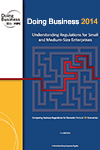Overview
An economy’s competitiveness is driven by many factors, including how quickly, reliably and cost-effectively the private sector can trade goods. Today’s manufacturers and agricultural producers operate in a global supply chain. Thus an efficient international trade system can increase economic opportunities and improve livelihoods—especially in poor economies with small domestic markets.
But in many parts of the world, international traders must spend a lot of time preparing and submitting information to government offices, each with its own rules and form requirements. These reporting requirements are often confusing, overlapping and onerous. A single window system can improve information flows by sharing needed information with all parties involved in trade. Today 73 economies have single window systems of varying complexity.
This case study describes the experiences of Singapore, Colombia and Azerbaijan. By choosing 3 economies in different regions with different degrees of single window implementation, this case study aims to show the various approaches that governments take and the challenges encountered when pursuing effective single windows. Still, Azerbaijan, Colombia and Singapore offer some common lessons. To successfully implement single window systems economies must do so through strong political will and commitment. Moreover to sustain momentum for reform over many years and move things forward it is crucial to have a lead agency as well as collaboration between government and the trade community.

